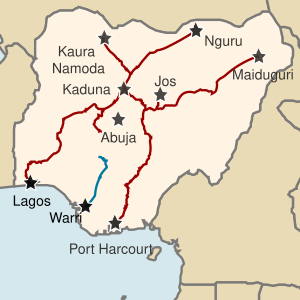Rail transport in Nigeria

Railways in Nigeria are operated by the Nigerian Railway Corporation. As of 2003, Nigeria's poorly maintained rail system had 3,557 kilometers of 3 ft 6 in (1,067 mm) gauge track. The country has two major rail lines: one connects Lagos on the Bight of Benin and Nguru in the northern state of Yobe; the other connects Port Harcourt in the Niger Delta and Maiduguri in the northeastern state of Borno.
In recent years, the railway network has progressively fallen into a state of disrepair. As of early 2013, the only operational segment of Nigeria's rail network is between Lagos and Kano. Passenger trains take 31 hours to complete the journey at an average speed of 45 km/h.[1][2]
In order to remedy the poor condition, efficiency, and profitability of the nation’s railroads, the government is seeking to privatize the Nigerian Railway Corporation. Under the privatization plan, the railways will be split into three concessions, each to be awarded for a period of 25-30 years.[3]
Status
Years of neglect of both the rolling stock and the right-of-way have seriously reduced the capacity and utility of the system. Couplings of the chopper kind, vacuum brakes and non-roller bearing plain axles are also obsolete. A project to restore Nigeria's railways has been underway since 2009.[4]
In 2006, the government contracted with the China Civil Engineering Construction Corporation to build the Lagos-Kano Standard Gauge Railway. It was later decided to complete the project in segments due to a lack of funds. After many delays, the segment from Abuja to Kaduna is expected to begin operations in May 2016.[5][6] Other segments have not yet begun construction.
A project is also underway to construct the Abuja Light Rail, but the project has also faced delays.
There are no railway links with adjacent countries. There were plans to establish rail links to Niger through Illela in Sokoto state and Cameroon, but these have not yet been built.
Maps
See also
References
- ^ Ross, Will (13 February 2013). "Can Nigeria's renovated railway unite north and south?". BBC.
- ^ "A slow but steady new chug". The Economist. 9 February 2013.
- ^ Smith, Kevin (16 February 2015). "Privatisation bill for Nigerian railways approved".
- ^ Nigerians Take to the Tracks, as Railway Chugs Back to Life, This Day Live, 2012-01-01
- ^ Odittah, Chuka (27 January 2016). "Hope dims on N170 billion Abuja-Kaduna rail project". The Guardian (Nigeria).
- ^ Agabi, Chris (19 February 2016). "Abuja-Kaduna rail to become operational in May". Daily Trust.
External links
![]() Media related to Rail transport in Nigeria at Wikimedia Commons
Media related to Rail transport in Nigeria at Wikimedia Commons
